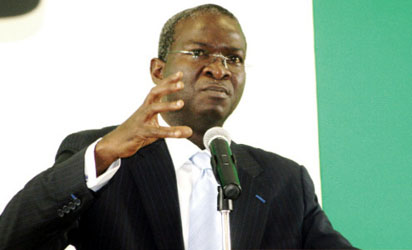Says it is an increasing urgent necessity to provide secure and sustainable way of life for the 21stCentury population

Minister for works,power and housing
“We cannot afford to fail our Nations. We cannot afford to fail our peoples. We must not fail the future generation” – Fashola
The Federal Government has called for urgent global action on sustainable urban development as an imperative for a secured future for the growing world urban population at the Third United Nations Conference on Housing and Sustainable Urban Development (Habitat III) in Quito, Ecuador.
In a Country Statement read on behalf of President Muhammadu Buhari at the global event, the Minister of Power, Works and Housing, Mr. Babatunde Fashola SAN, said such global action had become an increasingly urgent necessity if the 21st Century was to provide a secure and sustainable way of life for the growing global population.
Fashola, told the gathering of world leaders, “The economic and health imperative to plan for people-centered societies and sustainable cities is no longer a luxury, but an increasing urgent necessity if the 21stCentury is to provide a secure and sustainable way of life for the growing global population”.
Acknowledging that it would not be easy to embark on such development given the rapid growing urban population, Fashola, who noted that there were inherent opportunities in the challenges of urbanization, added that with political will and with the New Urban Agenda as blueprint, the world could secure a sustainable future.
The Minister declared, “It will not be an easy task, neither will the turn-around come quickly, but we strongly believe that through strengthened political will and intelligent planning, we can improve the lives of millions with the New Urban Agenda as our blueprint and road-map to a sustainable future”.
Calling for the strengthening of UN-Habitat “as the focal point for its effective implementation and review”, Fashola added, “We must collectively agree on the common principles that will guide our response to the challenges facing human settlements and ensure that we embark on a path of sustainable urbanization over the next two decades, as aptly captured in the New Urban Agenda”.
The Minister, who noted that the decisions arrived at the Ecuador Conference would have long-term consequences for cities, and their dwellers, as well as for the wider issues of human sustainability and the quality of life of future generations, added “Indeed, as the world waits in anticipation for the outcome of this landmark Conference, we cannot afford to fail our Nations. We cannot afford to fail our peoples. In fact, we must not fail the future generation”.
On the benefits and opportunities derivable from functional and sustainable urban centres, Fashola, who said they were already evident, pointed out that as crucial engines of growth for the economy and concentrations of activity and places of connectivity, creativity and innovation, “cities offer a multiplier effect for the development of their surrounding areas”.
“Urbanization can help to jump-start industrialization and manufacturing, which in turn can result in a host of other productive and economic development processes. The occurring rapid urbanization must therefore be exploited to unlock its economic potentials, and provide a solution for rapid transformation of our urban centres”, the Minister said.
According to him, “This Habitat lll Conference presents this precise opportunity. It is for us a reminder, and a call to action on our obligations if our cities are to be properly positioned to play a meaningful role in achieving the targets of the 2030 Agenda for Sustainable Development and its Sustainable Development Goals (SDGs), as well as the Paris Agreement on Climate Change, and other internationally agreed instruments aimed at creating productive lives for the growing number of urban dwellers”.
“Certainly, we owe humanity a responsibility to significantly step-up political commitments globally if we are to ensure a better quality of life – one that is dignified and productive- not only for all our citizens today, but especially for the generations to come, for whom we are merely holding the earth in trust”, he said.
Fashola said nations must take bold and decisive measures to implement the provisions of the New Urban Agenda at all levels, and mobilize commitments for institutional and attitudinal changes backed by innovative funding arrangements adding that in order to record success the Private Sector and development assistance must be tapped into.
This, he said, was necessary in order to provide capacity, finance and technology to address in a comprehensive manner the critical challenges of homelessness, growing poverty, social exclusion, urban sprawl, lack of basic infrastructure and services, environmental degradation, increased vulnerability to disasters and the food and energy crises.
The Minister said in order to make the programme both inclusive and comprehensive, special provision must also be made for those with disabilities, women and youth in the human settlements policies through programmes and projects targeted at achieving equitable and efficient growth.
Nigeria, on her part, the Minister said, has demonstrated renewed political will to install a well-functioning urban system through the pursuance of efficient, transparent and accountable governance, including progressive economic reforms that were directed at creating jobs, reducing poverty and promoting stability – which are all essential elements to sustained growth and development.
Noting that the country is currently one of the largest economies in Africa, blessed with significant natural and human resources, and with growing democratic institutions, the Minister added that as a mark of her commitment to the global urban development agenda, the country has endorsed the provisions of the New Urban Agenda with its strategic interventions to reverse identified urban lapses and ills.
“The Administration, under the leadership of President Muhammadu Buhari, has demonstrated renewed political will to install a well-functioning urban system through the pursuance of efficient, transparent and accountable governance, including progressive economic reforms that are directed at creating jobs, reducing poverty and promoting stability – which are all essential elements to sustained growth and development”, the Minister said.
Pursuant to this commitment, he said, the country’s priority interventions have included among others, increased investments in affordable housing, modern road infrastructure, highways, bridges and robust, efficient transport networks adding, “The National Housing and Urban Development Policies have been reviewed, with the incorporation of new development strategies for dealing with the pertinent issues of housing finance, climate change, resettlement, participatory governance, and better land management and administration”.
Fashola said in order to remove the inhibitions and obstacles to the supply of affordable housing units and to bridge the huge housing gap, Nigeria recently embarked on developing a sustainable National Housing Programme, that would form the bedrock for aggressively reducing the housing deficit in the country.
According to the Minister, critical features of the programme include; “Responsiveness to the needs of the end users based on surveys, affordability analysis and income differences; Responsiveness to cultural and climatic diversity; Responsiveness to local economic needs and focus on SMEs and cottage industries as drivers of building inputs like doors, windows, plumbing and electrical fittings; and Piloting and validating the concept by starting small with a N35 billion ($115million) to prove the concept“.
Noting that the country has over the past six years contended with a violent insurgency in its North-East region, resulting in the dislocation of many communities, and extensive damage to public infrastructure and basic services, Fashola said, “Government’s strategic response has included a comprehensive humanitarian response actively supported by the United Nations System and International Non-Governmental Organizations, as well as our local Civil Society Organizations, to whom we remain deeply grateful”.
The Minister said Government has evolved an elaborate redevelopment plan which, according to him, would soon be launched by President Buhari through the intervention of the Presidential Committee on the North-East Initiative (PCNEI) towards the rehabilitation and reconstruction of areas affected by the insurgency and relocation of the displaced populations in their communities.
He said despite the difficulties associated with the prevailing economic challenges which include the slowing GDP growth, high poverty rate and infrastructure gap, the Government has recently been exploiting new sources of growth in agriculture, industrialization, telecommunications and services.
“Our economic diversification policies, coupled with improved fiscal management are translating into significant decline in poverty levels, and bringing strong growth”, Fashola said adding that the Nigerian Industrial Revolution Plan (NIRP) launched in 2012, provides a strategic and integrated Roadmap towards industrialization with an actionable plan across three sectors: agro-allied, solid minerals and oil and gas-related industries.
The Minister said stronger public-private partnerships for roads, agriculture, and power were also being developed to meet the overall national vision of promoting growth, creating jobs and generating wealth adding, “It is in furtherance of these, that Nigeria prepared its Habitat III National Report, and equally initiated and funded the development of a Common African Position for Habitat lll (CAPH3)under the auspices of the African Urban Agenda Project in full partnership with African Governments, UN-Habitat, the AU and UNECA, as a strategy to revitalize African cities.
He expressed delight that the essential elements of CAPH3 as endorsed by African Heads of States and Governments at the 27thOrdinary Assembly held in Kigali, Rwanda in May this year, were fully integrated in the New Urban Agenda, commending the support of his colleague African Ministers who worked diligently to bring it to fruition.
Congratulating President of the Bureau on his election, Fashola, who was also one of the three Vice Presidential nominees representing the Group of African States, expressed confidence that with the President’s wise guidance and support of members of the Bureau, the desired outcome at the Conference would be achieved
The Minister, who also conveyed President Buhari’s wishes of a successful Conference, expressed, on behalf of the Nigerian delegation, appreciation to the Government of Ecuador for the warm reception accorded them since the delegation’s arrival adding, “We appreciate the excellent work of the Preparatory Committee infinalizing the New Urban Agenda on schedule for adoption by this Session“.





